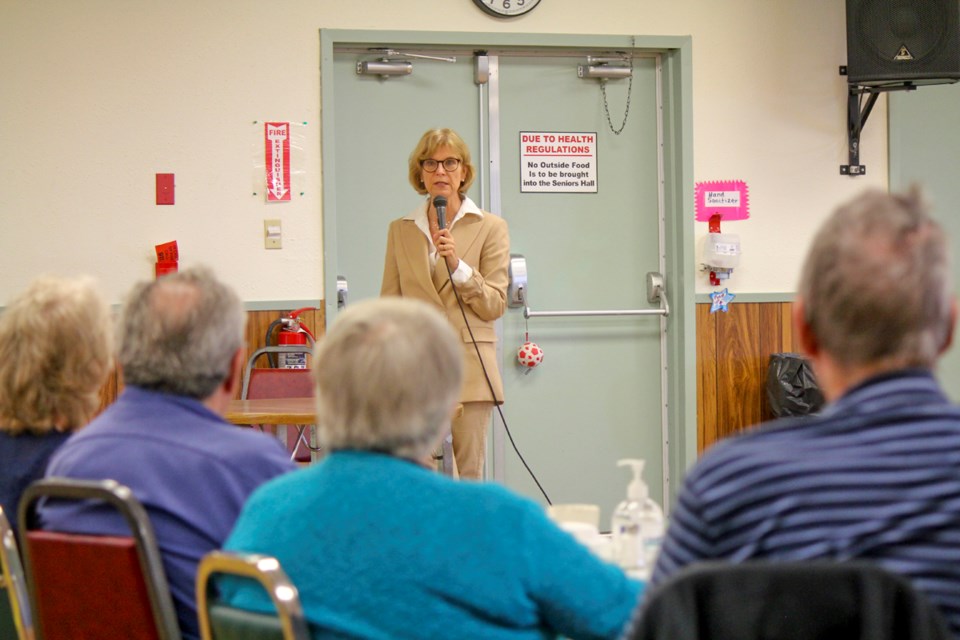B.C.’s seniors advocate Isobel Mackenzie was in Fort St. John Thursday, hearing a range of concerns about local health services, political representation, and the rising cost of living in the northeast.
Three dozen residents turned out to the Seniors Hall to meet with Mackenzie, her first trip to the city since the pandemic.
“The takeaway is reinforcing that rural, remote, northern seniors do face special challenges,” said Mackenzie. “They don’t get the level of services, supports that seniors in more populated areas of the province do, like the Lower Mainland.”
The state of healthcare was a top concern for many who attended. Wendy Clayson, president of the Fort St. John Senior Citizens Association, said seniors were the hardest hit from COVID-19, whether it came to deaths, cancelled surgeries, or mental and social isolation.
And two years later, they're still contending with a system where medical resources are still stretched thin, inflation has hiked the cost of basic needs like clothing and food, taxes are increasing on property and fuel, all with a lingering worry that the region could lose one of its MLAs as electoral boundaries are reviewed.
“I’ve heard from lots of our public, when they phone to get information from the health unit or wherever, they get a message that they will be called back within seven working days,” Clayson said. “Here at the seniors hall now, I have noticed we are getting so many calls from people saying where do I get assistance for this, for housing, for Alzheimer’s.
“They’re already sounding broken by the time they’re calling here. They’re just looking for help,” she said.
Mackenzie acknowledged the impacts of the pandemic are far from over, though the world is in a different place than it was two years ago when it began, where there are now vaccines, a milder variant of the virus, and treatments for its disease.
"I think the next two or three years are going to be really challenging, and I think we will fix it but we are not going to fix it as quickly as we should,” Mackenzie said. “And there will be consequence for certain people because of it.”
But, she said the government can act “rather quickly” on basic cost of living matters, such as providing seniors with relief on things like heating and hydro, and looking at other ways to allow seniors on fixed incomes defer other household costs.
Matters of fuel price and carbon taxes are more complicated, but Mackenzie said a majority of seniors older than 85 still live independently. In the north, that means they need their vehicles for travel, and often travel longer distances without any real alternatives compared to seniors who live in urban centres in the south.
“If you’ve designed a system to encourage people to use other forms of transit, and you apply that to people in Northern B.C., it’s really problematic because the other forms of transit are not there,” she said.
Mackenzie adds the province could also move to directly fund seniors for home support services.
“This is a solution throughout the province, but in rural B.C. it is absolutely what’s going to be necessary, which is give people the money to hire the people directly,” she said, acknowledging live-in caregivers would most likely be immigrants. “When you go into a nursing home, you pay a bit and the government pays a lot. Together, it’s about $7000.”
“When I look at what people on home support in the Lower Mainland get, in terms of the number of visits, and you look at the north, they get a lot more service proportionately then they do up here. Number one, you don’t have the workers. Number two, it’s inefficient.”
Mackenzie was scheduled to meet with other seniors housing and advocacy groups, as well as with Mayor Lori Ackerman, during her trip to the city.
Clayson was appreciative of her visit.
“Having that personal contact, and their office is very good at helping seniors on an individual basis with whatever their problem is,” Clayson said. “They really do come through for the seniors and they really do hold the government’s feet to the fire. She’s doing a really good job.”



